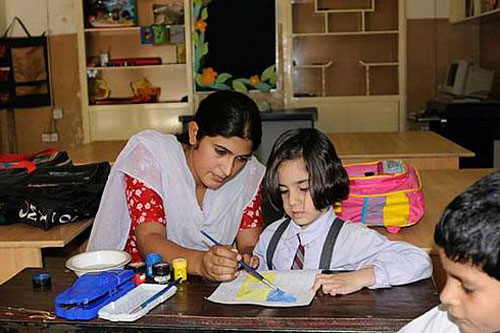Investing in teachers is urgently needed to provide the best possible opportunities for millions of children, youth and adults worldwide, the heads of various United Nations agencies on 5 October 2014 said in a joint statement marking World Teachers’ Day.
“An education system is only as good as its teachers,” the agency chiefs said, calling for more rigorous training, better conditions for employment, quality-based teacher recruitment, thoughtful deployment and attracting new teachers and talents, especially young people and women from under-represented communities.*
“Innovative, inclusive and results-focused teaching is crucial for 2015 and beyond,” they added in their message for the Day, which this year marks its 20th anniversary.
Global Shortage of Teachers
The statement was issued by UN Educational, Scientific and Cultural Organization (UNESCO) Director-General Irina Bokova; UN International Labour Organization’s (ILO) Director-General, Guy Ryder; UN Children’s Fund (UNICEF) Executive Director, Anthony Lake; UN Development Programme’s (UNDP) Administrator, Helen Clark; and Fred van Leeuwen, the General Secretary of Education International, which represents teachers’ organizations across the globe.
One of the main concerns in many countries is a lack of educators. An additional 1.4 million teachers are needed to achieve universal primary education by 2015, the second of the eight anti-poverty Millennium Development Goals (MDGs).
UNESCO reported last week that a global shortage of teachers has pressured many countries into hiring educators with little or no training, undermining the educational progress of numerous school-age children around the world.
A teacher and student at a school in India. Photo: UNESCO/GMR Akash
“We face today a global learning crisis, with 250 million children not learning the basics, over half of whom have spent four years in school,” the senior UN officials today noted.
They highlighted also that support for teachers’ effectiveness is part of the post-2015 sustainable development agenda draft. The ‘Global Thematic Consultation on Education,’ which is part of the draft, includes decent conditions of employment, good work environment conditions, high-quality pre-and in-service training for teachers and effective management, including teacher recruitment and deployment.
Moreover, the UN agency chiefs also noted that quality teaching depends on teachers enjoying basic rights, such as protection from violence, academic freedom and the freedom to join independent unions.
World Teachers’ Day, held annually since 1994, commemorates the anniversary of the signing in 1966 of the UNESCO/ILO Recommendation Concerning the Status of Teachers, and celebrates the essential role of teachers in providing quality education at all levels. The Recommendation concerning the Status of Teachers has, essentially, served as a charter of rights for teachers worldwide. (*Source: UN Release).
Filling Classrooms with Poorly Trained Teachers Undercuts Education Gains
In fact, on 2 October 2014, the UN education agency warned that a global shortage of teachers has pressured many countries into hiring educators with little or no training, undermining the educational progress of numerous school-age children around the world.**
In a press release ahead of World Teacher’s Day, marked annually on 5 October, the Institute for Statistics of the UN Educational, Scientific and Cultural Organization (UNESCO) reported that at least 93 countries have “an acute teacher shortage,” adding that some four million teachers would have to be recruited to achieve universal primary education by 2015 when the Millennium Development Goals (MDG) are expected to be met.
“A quality universal primary education will remain a distant dream for millions of children living in countries without enough trained teachers in classrooms,” said UNESCO Director-General Irina Bokova through the press release.
“Teachers are the core of any education system. Hiring and training new and already established teachers is fundamental to protecting children’s ability to learn in school.”
The new findings note that, of all the areas surveyed, Sub-Saharan Africa faces the greatest shortage, accounting for two-thirds of the overall number of teachers needed by 2030. The problem, added UNESCO, is being additionally exacerbated by the region’s steadily growing school-age population.
Not Trained Following National Standards
As countries are pressured to meet their universal primary education targets, many are recruiting teachers lacking even the most basic training. According to the data compiled by UNESCO, one-third of the countries surveyed had fewer than 75 per cent of primary school teachers trained following national standards. In Angola, Benin, Equatorial Guinea, Guinea-Bissau, Senegal and South Sudan, this figure falls below 50 per cent.
The costs of providing the training, however, would require an increased injection of funding into national education programmes, especially in Sub-Saharan Africa where the cost of paying salaries for the necessary additional teachers would total an extra $5.2 billion per year.
In particular, the Central African Republic, Mali, Chad and Malawi need to “significantly increase” their educational budgets as would Nigeria, which boasts the greatest number of children out of school in the world.
“Over the past decade, education budgets across Sub-Saharan Africa have been growing by 7 per cent in real terms, reflecting the commitment to get more teachers and children in classrooms,” observed Hendrik van der Pol, Director of the UNESCO Institute for Statistics.
“The good news is that most countries can afford to hire the extra teachers if they continue to steadily increase investment in education,” he concluded. (**Source: UN Release).
Read also:
Clashes in Chile as Thousands of Students Protest Lagging Education Reform
World Youth: No Jobs, No Education; Big Frustration, Scare
UNESCO Halts Education, Fight Against Extremism Activities As U.S. Withholds Its Dues












